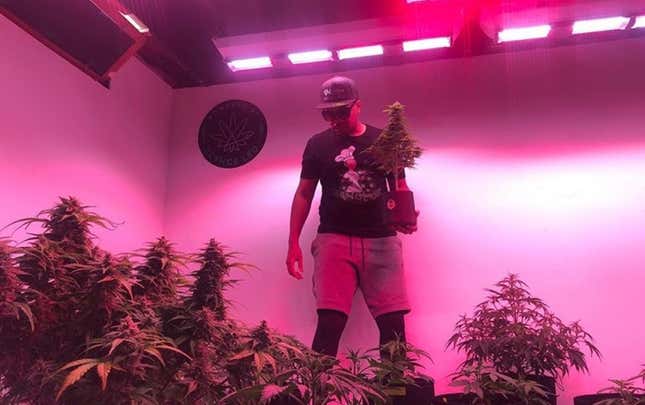
Twitch’s gardening section contains multitudes. Some people broadcast apple orchards. Others build birdhouses. Others play Stardew Valley. But at most times of the day, those streams are crowded out by one of the most instantly recognizable plants on earth: the seven-armed starfish, Beelzebub’s kale salad, other names I didn’t just make up. I speak, of course, about weed.
It is difficult not to joke on this, the hallowed day of 4/20 in the once-in-a-lifetime supernova that is the month of 4/20, but cannabis growing on Twitch is serious business. Many streamers have adopted a similar format: a camera on their plants—the number of which is generally limited to a small handful based on state and country laws—and lengthy streams of either cultivation and growth-related discussion or just the plants themselves. Some augment this with more personality-driven content like gaming, movie watching, or smoke sessions. A handful of these streams never end. Barring technical issues, they run 24/7. People show up in droves to watch this; the biggest cannabis streamers pull between 20 and 100+ concurrent viewers at any given moment. This, admittedly, is a far cry from the tens or hundreds of thousands who regularly show up to follow the cream of Twitch’s video game streamer crop, but it still totals out to thousands of people regularly watching cannabis streams on Twitch.
Why, though? Why do people take pleasure in watching grass grow? One of the biggest cannabis streamers, who goes by the handle PotQuest, says people used to show up to gawk at what they regarded as activities involving illicit drugs.
“There’s a major thing on Twitch with risky content—stuff that’s edgy,” PotQuest, who helps run a medicinal cannabis co-op in Riverside County, California, told Kotaku over a Discord voice call. “That’s where a lot of it was at first. There were a lot of folks that would enjoy seeing others getting high. I got that a lot. I’d get a lot of people who would ask me ‘Can you stop and smoke a dab?’ They love seeing that part, the inebriation.”
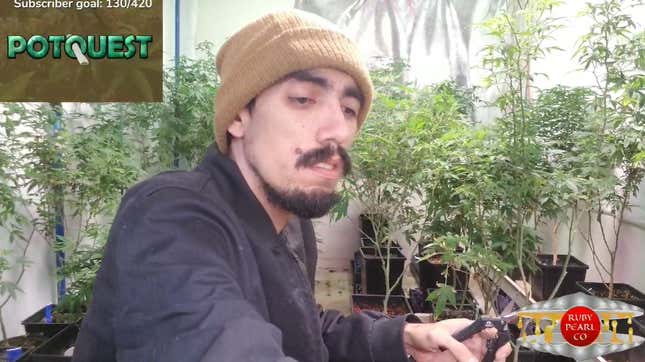
Just as some streamers get drunk and play games on Twitch, people have also taken to getting high and playing games to give their streams that all-important, viewer-drawing edge. To this day, some big-name streamers like Kaceytron joke about how they’re always high when they’re streaming. Most do not, however, regularly smoke on stream.
PotQuest said that in more recent years, a few factors led to the rise of streamers who focus mostly on cannabis growth and culture. For one, Twitch opened the floodgates to non-video game streamers, first with a monolithic IRL section in 2016, and then with a series of more focused sections in the following years. This meant that people could spotlight the plant itself instead of having their hands wrapped firmly around a controller for the majority of their streams. Around the same time, cannabis personalities on YouTube started to face pushback from the company, leading them to experiment with Twitch, which generally allows cannabis-related content as long as it’s legal in the state or country from which the streamer is operating and they don’t make any attempt to sell the cannabis. An emerging cannabis scene on Instagram grew the audience for cannabis streams even further, especially as personalities realized that Twitch afforded them opportunities for more elaborate camera setups and means of interacting with their communities.
Now people congregate around cannabis streamers on Twitch for a variety of reasons. It begins, said a cannabis streamer and author who goes by the handle Chef Anna, with curiosity.
“I think a lot of people never get to see the plants while they’re alive,” Chef Anna, who lives in Detroit, told Kotaku over the phone. “I know myself, my first time seeing a live marijuana plant, I had been smoking for years. I think that’s really the big thing about it: people being able to get more access and see those things, to then be able to grow and cultivate for themselves. And I think it’s more exciting to see exactly where your bud is coming from, how it was cultivated. It’s almost like watching a pet.”
Chef Anna has taken this idea and run with it, allowing viewers to sponsor specific plants, name them, and receive regular updates on their progress. “People get really invested in it,” he said. “They get to watch it grow from start to finish.”
The other big thing, said Canadian cannabis streamer TheBudLab, is community. Some people tune in because they’re interested in learning lessons about how to grow their own plants from an accessible group of experts. Others just want to hang out. TheBudLab has embraced this, creating a 24/7 stream that requires professional broadcasting equipment and multiple computers to keep it from melting down. By running a broadcast that includes multiple different forms of programming like human-free overnight plant cams, “wake and bake” early day smoke sessions, chat-based minigames, and more traditional video game streams, TheBudLab has cultivated an audience that shows up even when he’s not around.
“I’m taking a space that I have and building what is essentially a high tech growing facility that I’ve learned [how to create] more or less from the chat here on Twitch,” TheBudLab told Kotaku over a Discord voice call, comparing the construction of a DIY growing setup to the process of building a gaming PC. “So I think there’s a lot of people who come because they realize that they share the same passion as we do. One thing we push on our stream is ‘Never smoke alone.’ Any time you feel down or want to have a break, there’s someone always in the chat.”
LillyPain, a New England-based streamer who was prescribed cannabis to offset severe seizures after more traditional medication failed, thinks the communal element is a byproduct of cannabis’ history as a heavily policed substance.
“I mean, look out in California,” she said to Kotaku over a Discord voice call. “The biggest grows you’re gonna see are all ‘grow ops,’ because the only way to grow massive amounts is to get so many med cards together that that’s what it is. They forced us to be communal. How many people had their first smoke from a friend who got it from a who got it from a friend in college or something?”
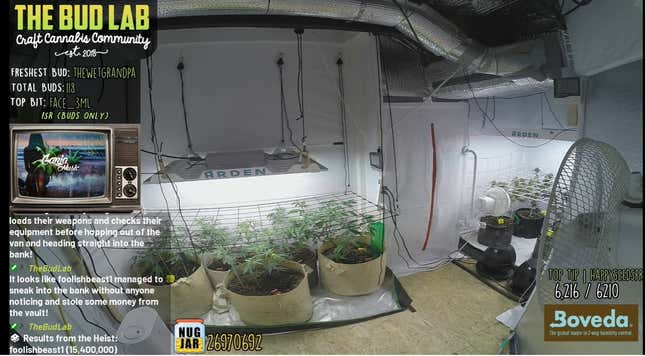
These days, cannabis is legal for medical use in 33 states and recreational use in 11. It’s also been recreationally legal across all of Canada since 2018. Still, there is a strong stigma against it in many places, in large part due to decades of “reefer madness” propaganda and the US government’s notorious, mass incarceration-fueling “war on drugs.” Cannabis streamers on Twitch say their communities are mostly educated and supportive, but they also get their fair share of inconsolably irate naysayers.
“I get them all the time,” said LillyPain. “I got one at 2 AM last night. ‘Isn’t that illegal? You should stop smoking. You know it’s bad for you,’ [they said]. But according to my neurologist, I shouldn’t stop or even take breaks if I can afford it.”
LillyPain regards these as teachable moments—most of the time: “Even if somebody comes in with caps-lock on and is a complete douchebag, I’ll typically just mute them, delete the comment, and try to educate them. But if it’s more than one person with an obviously piss-poor attitude, I’ll call in my mods to help me clean up the room.”
Cannabis streamers think that stigma against the plant impacts Twitch’s decision-making, too. Currently, there are no cannabis growing streamers who’ve achieved Twitch partner status, which would grant them additional money-making features and implicitly associate them with the Twitch brand. PotQuest, whose viewership semi-regularly peaks at or above Twitch’s 75-concurrent viewer partnership requirement, says he’s qualified for partnership eight times, only to be denied.
“I think they are very concerned about losing affiliation with groups that have something against cannabis,” he said, pointing to esports tournament sponsors and video game companies. “And if they were to tie themselves to someone like me, someone who does grow, they could lose those affiliations.”
SkinnyWhiteGrow, a Spain-based streamer who hosts a popular Spanish-language cannabis stream, said that Twitch has forced him to remove all chat emotes that reference cannabis usage. “They delete all the things that [reference] smoking or destructive behavior,” he told Kotaku over a Discord voice call. He also said that he can’t imagine anybody who centers their stream around cannabis getting partnered: “If you get partnered, you need to keep that behavior from streamers who stream to kids and stuff, you know?”
LillyPain agreed that PotQuest should be a partner and thinks her numbers will also be in the appropriate range within the next 12 months. However, she thinks she may “never” make partner. As a result of this and also the labor practices of Amazon, Twitch’s parent company, Lilly is vocally opposed to Twitch. She continues to stream on the platform because of the community she’s built there and because she believes that it’s important to educate people about the benefits of cannabis.
“There are very specific people on Twitch that I think would qualify as educational,” she said. “Those people shouldn’t be held back in any way, in my opinion.”
Kotaku reached out to Twitch to ask about the platform’s internal policies regarding cannabis, but as of this publishing, it did not reply.
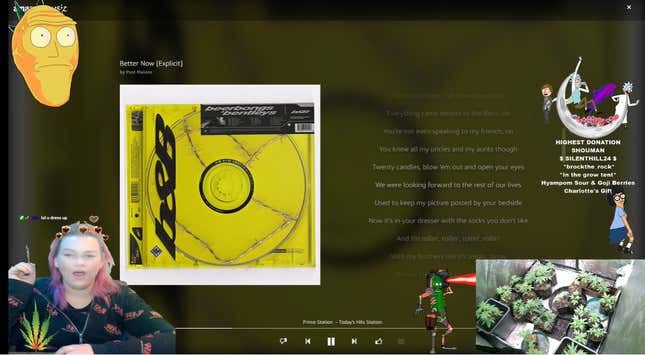
The streamers I talked to do not make full-time incomes from their streams, but thanks to sponsorships from companies that sell growth and cultivation-related parts as well as their own entrepreneurial ventures, they’re pulling in enough money to justify their efforts. This leaves them at an awkward intersection. On one hand, they’ve created an entertainment niche around something they’re very passionate about. On the other, they’ve done so during a time in which the scars of cannabis’ hyper-criminalized past are still all too visible. Hundreds of thousands of people get arrested for violations of marijuana law every year. In 2018, four of every ten arrests in the US occurred as a result of these laws. While many arrests do not end in prison sentences, around 84 percent of those federally sentenced for marijuana violations in 2018 were people of color, despite a negligible difference in usage rates between white people and people of color. And due to rules regarding multiple violations, some of those who’ve been imprisoned are serving decades-long sentences.
However, with legalization on the rise, marijuana has also become big business. Legal marijuana companies are now pulling in millions per year. Retailers, dispensaries, and pharmacies are expected to take in nearly $45 billion in revenue in 2024 from sales of all cannabinoids. It’s a booming industry, one that wouldn’t be possible without the labor and imprisonment of countless people of color. And yet, according to a report from Marijuana Business Daily, under one in five cannabis businesses nationwide are minority-owned. The industry’s uppermost tier is largely composed of white men.
While cannabis streamers are not making millions—or even anything close to that—it must be noted that many of the most popular streamers in this emerging scene are white or white passing. LillyPain, who is Puerto Rican but considers herself white-passing, acknowledged the disparity and the way it ripples out onto platforms like Twitch.
“There’s always going to be that, especially in the U.S., because the number one people that are going to be able to invest heavily in something already have the fucking money,” she said. “That tends to be white people here.”
Partially as a reaction to that, LillyPain has used her Twitch money to start a nonprofit focused on cannabis-based medication and education. “We don’t know how long [cannabis] is going to keep me alive,” she said. “I’d like to leave a legacy that actually stood for something.”
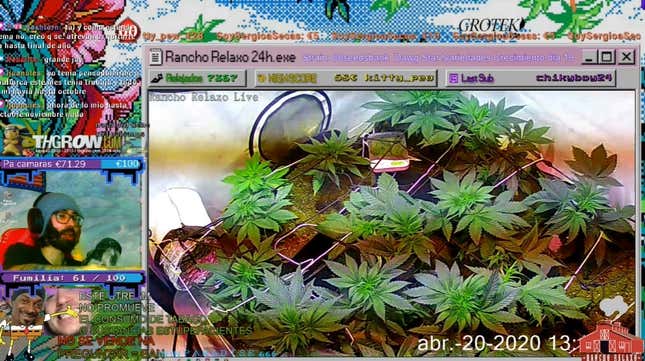
Chef Anna, who is black, is doing his best to be a visible presence against a homogeneous backdrop.
“There aren’t many people who look like myself, who are minorities, doing what I do,” he said. “But I just do what I can to represent myself and that group of people—and to show them that they can do it, too.”
There are also systemic initiatives he’d like to see people push for, programs some states are implementing that won’t undo a history of inequality, but could help balance the scales to an extent. These include the expunging of marijuana crimes from people’s records, as well as equity programs that seek to provide money, licenses, and other resources to minority-owned marijuana businesses.
“I would imagine it’s a slow process for anybody in that system to get a record expunged, and I’m not sure [people are in charge] are in a hurry to get that cleaned up,” Chef Anna said. “All we can do on our end is keep pushing for that—keep pushing for equity and for records to be expunged—and also to shed light on our industry moving forward so that people won’t have a reason to slow those things down or not follow through.”